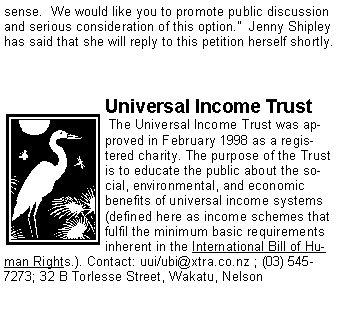|
|
|
|
|
(Continued from page 11)
tion to the November 1997 UBINZ newsletter. Rather, such a payment, set at any level, would be a radical departure from the current orthodoxy; that caregivers should only receive "transfer payments" whether from a partner, a former partner, or from the state. A UBI does not target caregivers. But it radically improves their position by removing the present targeting of breadwinners.
At present we pay disguised social dividends to breadwinners. My desire to both extend and make visible the present social dividend system represents a major gain to caregivers, in both income and status. This financial recognition of our unpaid and underpaid citizens fundamentally alters the existing system, but without creating any group of disaffected losers.
Celia, in her 1997 paper "Towards UBI: the Case for a Universal Child Benefit" claims that I propose "making solo mothers worse off than at present". I have certainly never proposed any such thing, and, as far as I can tell, low income solo parents are likely to be better off under the structure that I propose (which has no upper limit to income support) than under the "full UBI" (ie single-tier UBI) which by definition sets maximum levels of support. I am worried however at any universal income proposals that seek to "make children the first priority" (or anyone else the "first priority"). Such schemes target children.
In setting UBI parameters, there is a trade-off between addressing the problem of poverty and the problem of the poverty trap. For a given tax rate, a targeted scheme addresses poverty at the expense of the poverty trap, whereas a universal scheme treats the poverty trap
|
|
|
|
|
|
|
|
|
|
|
as the more serious issue. As I see it, a two-tier universal income system - a UBI - strikes the golden mean. It is certainly at the universal end of the targeting-universal continuum, but does not represent an extreme position. It is able to adequately address both problems at the cost of a moderately high rate of tax. Extreme universalism can only accomplish this with very high rates of tax.
Finally, I would like to note that any shift from a highly targeted form of income support to a substantially universal form must involve some (but not necessarily many) people getting less. That is a consequence of the nature of targeting. An illustration: at present we have one form of "income support" that is very highly targeted; it is called Lotto. By dividing the Lotto pool equally instead of creating substantial benefits to about 10 people, we necessarily make the targeted people (winners) worse off. Any genuine targeted system has, as winners, those who are targeted. Extreme targeting really is a lottery. In New Zealand, most of the present winners are in the tax-avoiding big business community.
The beneficiaries of the present system will oppose any shift to a UBI system, just as Lotto winners will oppose the confiscation of their winnings. Supporters of UBI should not assist the present recipients of corporate welfare in their aim to discredit UBI. We discredit UBI when we present exaggerated and/or uncosted proposals that can never hope to win the hearts and minds of ordinary New Zealanders. And we discredit UBI when supporters make inaccurate statements about each other's proposals.
|
|
|
|
|
|

